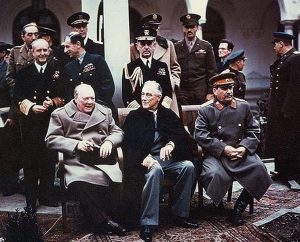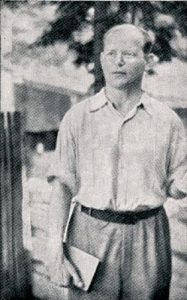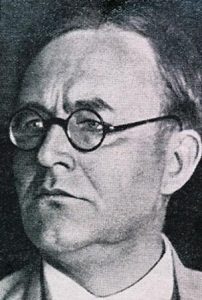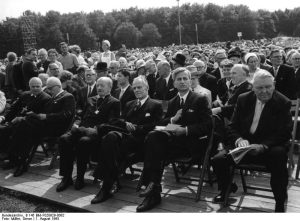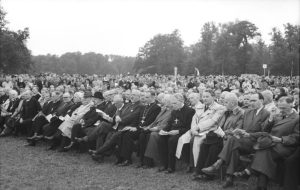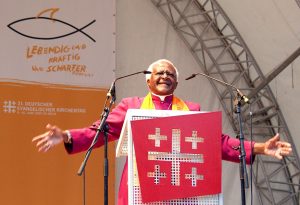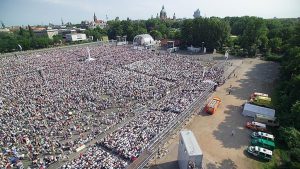Why a Kirchentag?
The Yalta Conference in 1945 had decided upon the partition of Germany into four occupation zones. The partition of Germany in two -the German Federal Republic and the German Democratic Republic- became effective in 1949. As early as 1948 German Protestant Churches Lutheran and Reformed under a regional status, until then, decided to get together and create a single structure, the German Evangelical Church, with its own welfare assistance services and evangelical Academies. These changes were the consequence of the recent events. But the new situation, still unstable and disquieting, implied creating concrete and visible opportunities for dialogue and reflection. One Kirchentag (Deutscher evangelischer Kirchentag, DEKT) organised to take the time to provide information, was unusual and demanging.
The founder of the Kirchentag, Reinold von Thadden-Trieglaff (1891-1976)
Reinold von Thadden-Trieglaff was born in a family of Pomeranian squires. A legal expert and reserve officer in the Wehrmacht, he was secretary general of the Deutschen Christliche Studentin Vereiningung (German Christian Students Association), the German branch of the Universal Federation of Christian Students Associations, during the inter-war period. Among its activities, it was meant to revive a 19th century tradition of the Prussian Evangelical Church and to organise an occasional “sanctuary” -an “Evangelical Week” (Evangelische Woche) or day -Kirchentag.
In 1934, Reinold von Thadden-Trieglaff was one of the first who signed the Confession of Barmen, along with Karl Barth, Martin Niemöller, Hans Lilje, Dietrich Bonhoeffer, and a number of others who refused to submit the Protestant Church to Nazi rule.
During WWII his three sons died on the Russian front. His sister, Elisabeth von Thadden-Trieglaff, was beheaded in 1944 because she belonged to an active resistance network in France, in the Meaux region. He was obliged, as a reserve officer to join the Wehrmacht and become governor of the city of Louvain. There he protected the citizens threatened by Nazism as best he could, and was proclaimed Honorary Citizen in 1947. As he returned to Prussia in 1945, he was prisoner of the Red Army for a few months (his acts of resistance Nazism were soon acknowledged). He then decided to organise a Kirchentag, more or less modelled on the gatherings he had been responsible for, as the leader of the German Christian Students Association, before the war.
The early Kirchentagen (1949-1989)
The first meeting took place in Hanover (lower Saxony) in 1949 during Ascension week. Reinold von Thadden organised it with the help of his friend Hans Lilje, then the Lutheran bishop of the Land. About 30,000 people came from both Germanys. The quality of the gathering and the many unanswered questions, implied a continuity. The decision was made to renew it regularly, at least every two years in symbolically important places.
The next Kirchentag took place in Essen in 1950, a city in the Ruhr area, deeply affected by the war (unemployment, neighbourhoods in ruins). Then in Berlin in 1952 and Leipzig (East Germany) in 1954.
After the Wall was built in 1961, it was impossible to organise a Kirchentag in East Germany. Many meetings took place in West-Berlin and in other cities such as Stuttgart, Hamburg, Munich. Each was given a theme related to the present time and place. Workshops on theology, philosophy and culture were set up. Religious worship was interspersed with time for reflection. There were also exhibits of contemporary artists, and shows. A special organising team was dedicated to that task.
In 1989, the Kirchentag was a special moment of dialogue with East Germans who could attend. These contacts developed and played a part in the mobilisation of Protestant Churches in favour of the fall of the Wall in 1989 and the German Reunification in 1990. Reinold von Thadden-Trieglaff’ son of the historian Rudolf von Thadden (1932-2015) was particularly committed.
After the fall of the Berlin Wall
After the fall of the Wall the Kirchentag was committed to European reconciliation. More than 150,000 people came to the gatherings. Political and university leaders from almost all over Europe were responsible for plenary conferences. The attendees were asked to provide information stands to promote their activities.
In Berlin in 2003, the Kirchentag was ecumenical. After the council Vatican II, the German Catholic Church was concerned too, and regularly organised meetings called Katholikentagen. Contacts between leaders enabled the first common meeting to take place. Over 190,000 people took part, 40,0000 Catholics among them. Based on the general theme ‘You have to be a blessing’ four focus groups were opened: witnessing to the faith and living through dialogue; looking for unity and meeting diversity in others; respecting humanity as it develops and defending its freedom; shaping the world and acting responsibly. Exhibitions, shows, various participants’ stands were an integral part of then meeting. Other ecumenical Kirchentagen took place later.
The Berlin and Wittemberg gatherings in 2017, were dedicated to the 500th anniversary of the display of the Theses of Luther against the indulgences.
The organisation of a Kirchentag
A lay council, the Praesidium, defines the theme of the Kirchentag to come. It was first presided over by Reinold von Thadden-Trieglaff (1949-1964). He was followed (1964-1970 et 1979-1981) by Richard von Weizsäcker -president of the Republic to be. Elisabeth Raiser, the latter’s daughter, managed the preparation of the ecumenical Kirchentag (2001-2003). Christine Aus was in charge of the 2017 one.
Given the number of attendees – about 30,000 in the beginning and over 200,000 after the fall of the Wall – organising such gatherings requires much attention. The general secretariat, managed by a minister of the German Evangelical Church, is in charge. The headquarters are in Fulda (Hesse). The secretariat organises lodging, workshops, plenary conferences. It raises funds notably from the evangelical academies of the hosting Land, but also from public or private lay foundations.

